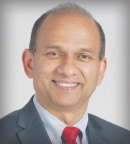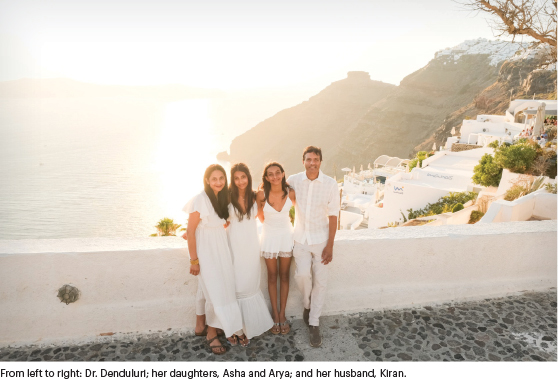Growing up in Draksharamam, a small village in India, Neelima Denduluri, MD, FASCO, was attracted to the field of medicine after witnessing her grandfather, a general practitioner in the village, care for patients so poor he often provided medical services at no cost. Although Dr. Denduluri’s grandfather never talked about the inequities in medical care in the country, his actions left such an indelible impression that Dr. Denduluri knew she wanted to be of public service, too. She had found her career.
Neelima Denduluri, MD, FASCO

On choosing the field of oncology: “Since medical school, I knew I wanted to specialize in breast cancer. I think it was the love of science, but also the human connection I could have with patients, that made me decide to specialize in oncology.”
On participating in ASCO’s Leadership Development Program: “Participating in that year-long program was incredibly important in shaping my career trajectory.... That experience heightened my awareness of the impact we can make on both the federal and local levels to improve care for patients with cancer.”
On moving from oncology practice to industry: “I see myself as a connector, advocating for innovative medicine in the pharmaceutical sphere, translating evidence into guidelines, and fighting for equity in community settings. My hope is to create a future for cancer care that is defined as much by compassion and access as it is by scientific excellence.”
“I idolized my grandfather, so, of course, I knew I was going to follow both in his footsteps and in my father’s footsteps, who became a physician, too, and practiced as a urologist in Morgan City, Louisiana,” she explained.
After emigrating to the United States from India in 1982, the family settled in Morgan City, where Dr. Denduluri attended the Louisiana School for Math, Science, and the Arts. She graduated from Louisiana State University (LSU) in Shreveport in 1995 and received her medical degree from LSU School of Medicine in 1999.
It was while attending medical school and learning about pharmacology and chemotherapy drugs and the advances being made in treatments for cancer that Dr. Denduluri decided to pursue a career in oncology. One of her professors, Gary V. Burton, MD, was also a clinical researcher who engaged Dr. Denduluri in a project studying how well patients with breast cancer understand the information they receive from oncologists about their diagnosis and the potential for cancer recurrence. This early experience in clinical care and research eventually led Dr. Denduluri to achieve leadership roles in designing and conducting clinical trials, especially research in breast cancer; addressing disparities in cancer care; and improving quality of life for cancer survivors.
Chronicling a Steller Career
Dr. Denduluri completed her internal medicine residency at Georgetown University Medical Center in Washington, DC, followed by a fellowship at the National Cancer Institute (NCI), where she served as Chief Fellow. She later served as Assistant Clinical Investigator and Staff Physician at the NCI before joining Virginia Cancer Specialties and serving as Associate Chair of Breast Medical Oncology for The US Oncology Network; Director of Breast Cancer Research; and Co-Director of the Virginia Cancer Specialists Research Institute. In 2021, Dr. Denduluri left clinical practice and clinical trials research to serve as Global Clinical Lead in Late Phase Research and Development at AstraZeneca, where she now holds the position of Vice President of Medical Affairs.
An ASCO member since 2004, Dr. Denduluri has held positions on ASCO’s guideline development panel and has contributed to the Society’s policy initiatives and educational content. A lifelong advocate of equity in medicine, Dr. Denduluri is a board member of the Arlington Free Clinic in Virginia, which provides clinical care for low-income and uninsured individuals.
“At the clinic, I witness the barriers that uninsured and underserved populations encounter and work with a passionate team to overcome these barriers. By implementing outreach, mentoring the next generation of leaders, and expanding access to diagnostics and supportive care, we’re trying to level the playing field and ensure that everyone benefits from advances in oncology,” said Dr. Denduluri.
Guest Editor

Jame Abraham, MD, FACP
Dr. Abraham is Chairman of the Department of Hematology and Medical Oncology at Cleveland Clinic and Professor of Medicine at Lerner College of Medicine.
In this installment of The ASCO Post’s Living a Full Life series, Guest Editor Jame Abraham, MD, FACP, spoke with Dr. Denduluri about her journey from clinican and researcher to industry leader at AstraZeneca. Here are excerpts from their conversation, which has been edited for length and clarity.
Choosing the Field of Oncology
Dr. Abraham: You have had such an interesting and varied career in the field of oncology both in clinical care and research and now in the pharmaceutical industry. What led you to the field of oncology? Is there one person you credit with inspiring you to choose this subspeciality of internal medicine?
Dr. Denduluri: I would say it was two individuals, Gary V. Burton, MD, and Marc E. Lippman, MD, Professor of Oncology and Internal Medicine at Georgetown University Medical Center. Dr. Lippman also co-directs the breast cancer program at the Lombardi Comprehensive Cancer Center.
Since medical school, I knew I wanted to specialize in breast cancer. I was interested in working in women’s health and in a specialty in which a lot of progress was happening in more effective therapies for breast cancer. I worked with Dr. Lippman caring for patients with breast cancer and remember him telling me what a breakthrough trastuzumab was in the treatment of HER2-positive breast cancer after its approval by the U.S. Food and Drug Administration in 1998. So, I think it was the love of science, but also the human connection I could have with patients, that made me decide to specialize in oncology.
Making Progress in Cancer Treatments
Dr. Abraham: Please talk about your interest in cancer research.
Dr. Denduluri: After training at the NCI and receiving mentorship from Sandra M. Swain, MD, FACP, FASCO, I started working as a clinical research physician at The US Oncology Network in 2007, and that experience provided me with the ability to see patients and do research. It also allowed me to engage with patients and colleagues not only at the community level within the various hospital systems, but also from a national level as Associate Chair of The US Oncology Network’s Breast Cancer Research Committee for nearly a decade.
My experience in clinical practice has deeply informed my understanding of patients’ day-to-day challenges....— NEELIMA DENDULURI, MD, FASCO
Tweet this quote
I am truly excited about the progress we are seeing in more effective treatments of diseases like breast cancer and the strides we are making in personalizing treatments for individual patients, which are the results of decades-long, painstaking research.
Making an Impact
Dr. Abraham: You were a participant in ASCO’s Leadership Development Program in 2017. How did that experience influence your clinical and research career, as well as your current position with AstraZeneca?
Dr. Denduluri: Participating in that year-long program was incredibly important in shaping my career trajectory, because I got to know peers working in other disciplines, including gynecologic oncology and genitourinary oncology, who I still consult with today to hear their suggestions on what important initiatives we should be working on at AstraZeneca. ASCO’s Leadership Development Program also helped me gain insight into ASCO’s roles and mission. For example, ASCO’s Hill Day, which is part of the annual ASCO Advocacy Summit, during which ASCO members meet with lawmakers on Capitol Hill to advocate for policies that improve cancer care and research. That experience heightened my awareness of the impact we can make on both the federal and local levels to improve care for patients with cancer.
From Oncology Practice to Industry
Dr. Abraham: Why did you make the move from a large breast oncology practice and research in the disease to the pharmaceutical industry?
Dr. Denduluri: My journey in oncology has always been driven by a core mission to bring the most promising scientific advances to all patients, regardless of their circumstances. My experience in clinical practice has deeply informed my understanding of patients’ day-to-day challenges and what treatments mean not only for their prognosis, but for their quality of life as well, and I wanted to build on that experience.

I also wanted to understand how medicine is practiced across the globe and learn new skills, and I thought what better way to accomplish those goals than in my research and development role at AstraZeneca. Collaborating with scientists, trialists, and clinicians, we focus on designing trials that ask the right clinical questions and that reflect the complexities of real-world practice. We work to ensure that promising innovations, from targeted therapies to novel immunotherapies, are developed with patient priorities front and center. My clinical insight and experience leading multifaceted initiatives have helped guide portfolios and programs, so our research and care delivery remain both rigorous and relevant.
Bringing together these roles, I see myself as a connector, advocating for innovative medicine in the pharmaceutical sphere, translating evidence into guidelines, and fighting for equity in community settings. My hope is to create a future for cancer care that is defined as much by compassion and access as it is by scientific excellence.
Each part of my career has reinforced the other. These roles keep me patient-focused and an advocate for equity and innovation in oncology.
Finding Work/Life Balance
Dr. Abraham: How are you able to balance both a busy career and a busy home life?
Dr. Denduluri: I have two daughters, and it’s wonderful to watch them grow. I look forward to all the great things they are going to do in life.
Like all of us, my husband and I lead busy lives, so we have to work at making sure we build in family time. I have a huge family and a large group of friends, and spending time with them really energizes me. I love reading, hiking, taking long walks, and playing tennis when I can. All of these activities invigorate me and help me strike that balance between my work and home life.
It is important for me to figure out a way to give back to my community—no matter how busy my life gets. One of the ways I try to give back is through Conquer Cancer, The ASCO Foundation, because research is so important to improving outcomes for patients worldwide. And, of course, there is my work at the Arlington Free Clinic, which provides comprehensive, whole-person health care to individuals who otherwise would not have access to cancer care. These causes are important because they provide ways to ensure that underserved populations, no matter where they live, have access to cancer care, so everyone has a chance to survive and thrive after cancer.
DISCLOSURE: Dr. Denduluri is Vice President of Medical Affairs at AstraZeneca.

